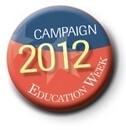Charlotte, N.C.
Parent-trigger laws—now in four states—are getting their “red carpet moment,” first on the silver screen with the film “Won’t Back Down,” and now at the political conventions. The latest venue: a showing of the film and panel discussion on Monday, a day before the Democratic National Convention’s official kickoff. (There was a similar event at the GOP convention in Tampa, Fla., last week.)
Parent-trigger laws give parents tools to restructure operations at failing schools, for example by converting them to charter schools by petition. But it’s clear that not everyone in the Democratic Party is ready to give the policy five stars—and that leaves some of the parent-trigger champions frustrated.

They argue that “liberals” should be for the trigger laws. In fact, parent trigger started as a lefty critique of dysfuctional schools and parents’ inability to influence them, said Ben Austin, the executive director of Parent Revolution, the Los Angeles nonprofit organization that is a force behind the policy, who spoke at a panel discussion after Monday’s screening of the film.
The laws allow parents to “unionize and collectively bargain, just like teachers’ unions,” said Austin, who served in the Clinton White House. “Parent trigger fundamentally makes public schools more public. ... We need to be modern 21st-century progressives” who stand for government working.”
The panel included the film’s Daniel Barnz; Michelle Rhee, the former District of Columbia schools chancellor and founder and CEO of StudentsFirst, an education redesign advocacy organization in Sacramento; and Joe Williams, the executive director of Democrats for Education Reform, which helps finance Democratic candidates who support policies like merit pay and charter schools.
The Obama administration hasn’t come out swinging in favor of parent trigger, but some prominent Democrats, like U.S. Rep. George Miller, the top Democrat on the House education committee, are fans.
Williams, of DFER, said that President Barack Obama’s administration has helped create a good policy environment for education redesign. But he’s disappointed that the Obama the campaign hasn’t put much focus on the president’s “reformy” record on the campaign trail.
“I do wish President Obama was talking more about what he has already done,” Williams said. “We realize that he pulled some levers that are historical with Race to the Top and Investing in Innovation,” referring to two signature Obama competitive programs.
Enthusiastic Reception
The reception to the movie inside the EpiCenter theater, which held about 400 people, according to StudentsFirst, a co-sponsor of the event, was roundly enthusiastic. One typical review from Patricia Jones, who works in customer service at Duke Energy: “I thought it was great. The emphasis was on kids, not [school] systems.”
But there was a sprinkling of protestors—I counted about four, though there may have been a couple others—gathered outside who criticized the film. They carried big Styrofoam pencils and wore signs that said “More Teaching, Less Testing.”
Pam Grundy, who organized the protest as part of her work as a co-founder of Parents Across America, an advocacy organization hasn’t seen the film, but has had “long conversations” with folks who have, and she said she has a fairly good idea of what’s in it.
She criticized it for painting a picture of “awful teachers"—which sounds a lot like what Randi Weingarten, the president of the American Federation of Teachers, said about the movie last week. (I haven’t seen the movie in its entirety, but according to my colleague Ross Brenneman’s can’t-miss review, it presents a mixed picture when it comes to teachers—some bad apples, but also some amazing educators. The main villain in the film is poverty, Ross wrote.) Grundy said later her main beef wasn’t with the movie as much as it was with the groups who organized the event and their policy ideas, such as “relentless” charter school expansion.


